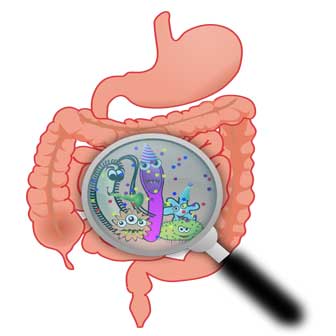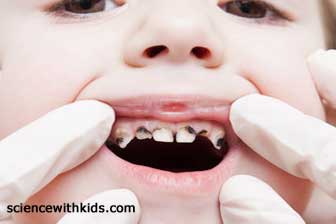Gross Body Facts
Posted by Admin / in Science Facts

Gross Body Facts - Germs
- Your mouth has millions of bacteria that both help and damage your body. Sugar and other foods can combine with saliva and bacteria to form plaque on teeth. The plaque is acidic and will eventually eat through the outer enamel protection on teeth. Once the enamel is gone, bacteria will eat away teeth causing decay and cavities.

Decaying teeth resulting from plaque destroying the teeth.
- People get sick more often when they are near other people. Kids at school, shopping and airplanes are all places where people have a lot more exposure to other people's germs.
- As you know your body contains snot/phlem/mucus material, but why? Your body produces well over a cup of this stuff, even on a normal day. The total amount is based on you size and health. When you are sick or have a reaction to an allergy, the body makes even more mucus to keep the lining of the nose and sinuses moist.
- People's sneezes have been measured from 30 to 60 miles per hour. A sneeze this powerful is capable of shooting phlem up to 30 feet across a room.
- People do not shed their skin all at once like a snake, but do shed small amounts of skin every day. The average person sheds about 0.5 to 1.5 pounds (.2 to .6 kg) of skin per year.
- Dust mites are tiny creatures that eat dead skin. Many people are actually allergic to dust mites, however, there are millions of dust mites typically crawling on your pillow and bed feeding on dead skin that falls off your body. Some pillows over time actually contain more dust mites than stuffing!
Gross Body Facts - Liquids and Gases
- A burp is gas escaping from your stomach through your mouth.
- As your large intestine breaks down the food you eat, some types of gas are produced. Large intestines are capable of producing nitrogen, hydrogen, carbon dioxide and the smelly methane and hydrogen sulfide gases. The average person passes 12 times per day to release this gas.
- Your stomach contains cells that release hydrochloric acid to low the pH of the stomach after food is eaten. The stomach also contains cells that make mucosa, which is a coating that lines in inside of the stomach to help neutralize the acid so the acid does not destroy the stomach. The acid in the stomach is strong enough to destroy a piece of wood. Normal stomach acid does will not destroy metal. Do not ever attempt this since it is extremely dangerous, but there are many cases of people who have shallowed coins where the coins have passed all the way through.
- People sweat every day, even when they are not exercising. The average person sweats 1 liter of sweat per day. If you exercise, have stress or become sick, you will sweat more. Sweat contains mostly water, but it also contains a small amount of sodium (salt), magnesium, calcium and potassium. Sweat also releases toxins and waste products. This may be why we sometimes get a fever when we are sick, to help get rid of toxins or material the body does not want. Sweat does not smell, but bacteria love sweat. Your body can become smelly when you sweat because of the bacteria.
- People who live in a warm climate can sweat up to 2-3 liters every hour. People who live in a cooler climate may only be able to sweat liter every hour. Our bodies adjust quickly. If you travel to a warm place in the winter, by the end of the week you likely will not feel as warm being outside. Your body has adjusted and is sweating more to keep you cool.
- An odd waste created from the body we all deal with is ear wax. Like sweat, ear wax is excreted from sweat glands.
